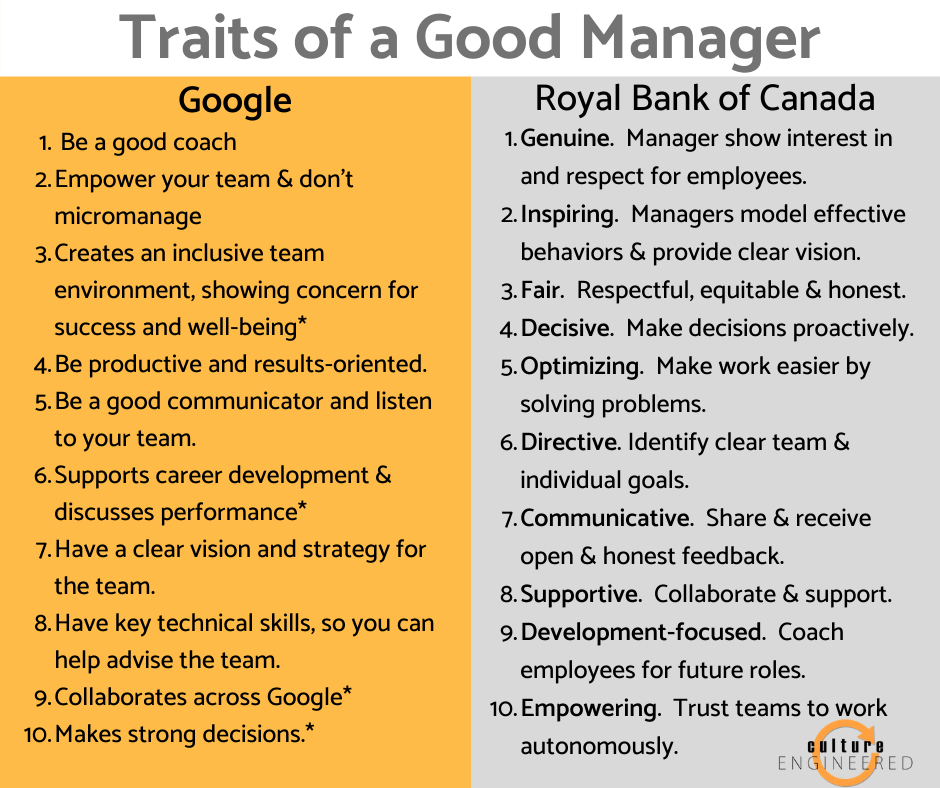Two separate studies were conducted by Google and the Royal Bank of Canada to determine what traits make for a good boss versus average or even bad boss. Here is what they discovered….
How many great bosses have you had in your career? For me, two stand out. One was with a job I hated, the other was with a job I loved. One was male, the other female. One was a lot like me, the other not like me at all….except maybe for our sense of humor. One was stubborn and feared by some in the organization. The other was the friendliest person you’ve ever met, quick to put others at ease. So, how is it that I would find these two VERY DIFFERENT people equally great? Had I changed over time? There were about ten years between these two bosses after all. I’ve worked with many great people but what made these two bosses great? There is no shortage of research on leadership; however two of my favorite studies were performed by Google (2008, then updated in 2018) and Royal Bank of Canada (RBC, 2011-2013) in separate attempts to determine what makes manager good?
What does a good boss look like?
Do you know a good manager when you see one? Based on the findings of both RBC and Google, not at first glance. Both studies report good manager traits having little to do with what the manager does, but how and why they do it. Micro-managing determined highly ineffective by both groups, suggesting a good manager’s day revolves more around strategy and developing or coaching employees; however nearly all other findings relate to how a good manager engages with employees. Being genuine and showing an interest in both personal and professional well-being for employees rate high on both lists suggesting empathy for others and authenticity are essential in making employees feel valuable. Today this should be no surprise. In 2017, Surgeon General Vivek Murthy wrote about the impact loneliness is having on the workplace. A person with a poor network of friends and family, lacking support needed to push through this epidemic of loneliness in most cases will still need to work, making work perhaps their only opportunity to feel connected. If true, doesn’t it only make sense employees respond positively to managers that seem invested in the employee’s personal journey? Look over the list provided here. How many listed traits do your top managers possess? More importantly, do you feel your under-performing managers can learn the traits and behaviors necessary to be more effective? Can a manager learn to be empathetic and genuine?

* Trait was either updated or revised in 2018
Why it matters
Google’s parent company, Alphabet, employs more than 107,000 people worldwide. The company owns more than 88% of search engine market share and is in the race to join the highly exclusive $1 trillion dollar list. RBC employs 80,000 people, and with 1.28 trillion dollars in assets is the biggest bank in Canada and the 11th biggest bank in the world. They look for ways to excel, commit to a solution, and go ALL IN. Google and RBC’s choice to independently research their own management practices that were proving to be effective versus ineffective and build their teams and leaders on these principles is no accident. This research, although beneficial to many, was not done for humanitarian reasons. Good managers drive success. In a study, employees working for a manager identified as average when changed to a manager identified as highly effective, increased productivity by 50%! Good bosses also have lower employee turnover and themselves also stay with companies longer than bad managers. It’s important to note, the 2008 Google study was only after Google surveyed their own engineers to determine whether managers were at all necessary within their organization. It was perhaps this initial project that led them to realize that a good boss is highly valuable whereas a bad boss is actually worse than no boss at all.
I stay in touch with each of my former managers. I trust that I can call either of them today and they will still take time out of their busy schedules to help me. I don’t know what their relationships were like with my peers or other leaders within our former organizations although I suspect those relationships were positive. It was perhaps a year ago that one of them reached out to me in need of a favor. I stopped everything I was doing and immediately jumped at the chance to help my former boss and friend. It was no different when I worked for these individuals. I cared as much about their success as I did my own. That’s the thing about a great boss – their fingerprints from pushing you forward, catching you when you fall….are EVERYWHERE in your life! A great boss changes your life, But because it’s authentic and they genuinely care and love their jobs, it happens so naturally and organically. Only in hindsight do you look back and wonder….were they working for me or was I working for them?
